Destination Care
Patients travel from afar to Vanderbilt-Ingram for innovative therapies
November 30, 2023 | Nancy Humphrey
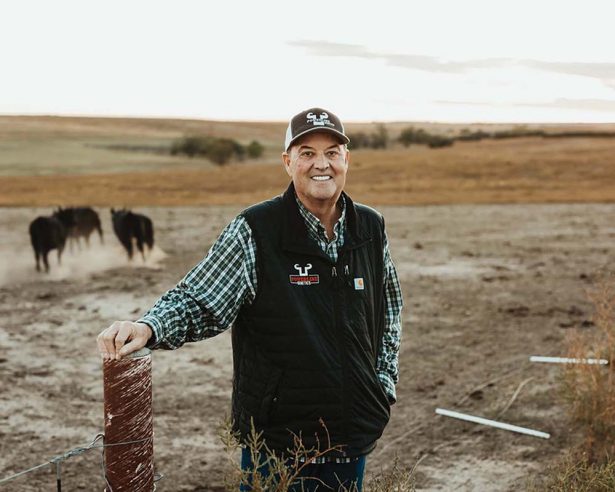
J.D. Anderson, a 64-year-old cattle producer from Arapahoe, Nebraska, who has been battling stage 4 colon cancer since 2012, has made the 28-hour round trip to Vanderbilt-Ingram Cancer Center, often monthly, over the past four years.
For the past three years, 5-year-old Jackson Simpson of Charlotte, North Carolina, has been receiving treatment for hepatoblastoma, a rare pediatric liver cancer, at Monroe Carell Jr. Children’s Hospital at Vanderbilt.
While the cancer programs at Vanderbilt-Ingram and Monroe Carell are committed to serving the people of Tennessee and surrounding states, patients also come from throughout the United States and abroad for their care. They come because of nationally ranked specialty programs and the internationally renowned physicians, many of whom are leaders in their fields.
Worth the Drive
Jackson’s parents, Jeremy and Deonna Simpson, brought him seven hours from home to Monroe Carell in early 2020 several months after his diagnosis when he was placed on the waiting list for a liver transplant.
His medical team included pediatric oncologist Daniel Benedetti, MD, assistant professor of Pediatrics in the Division of Hematology/Oncology, and the Simpsons developed a strong bond with him. Following a complicated transplant recovery that lasted almost two years — much of that time as an inpatient — they decided they would continue to make the drive for Jackson’s follow-up care.
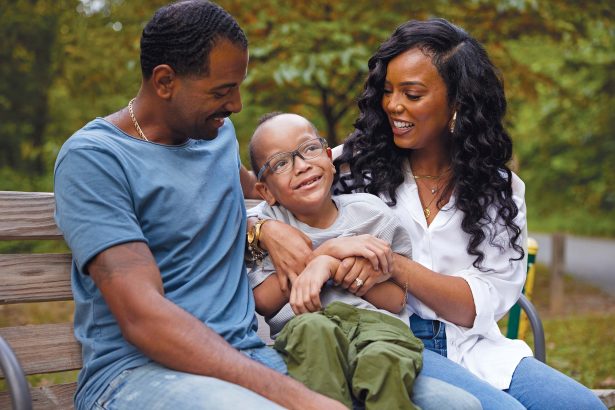
“To be completely honest, we keep coming to Vanderbilt because of the level of care and service we get with Dr. Benedetti and with the entire hematology/oncology team at Vanderbilt. We felt it was in our family’s best interest, and Jackson’s best interest, to have Vanderbilt, specifically Dr. Benedetti, continue his follow-up care,” said Deonna Simpson.
The family regularly communicates with Benedetti and travels quarterly to Nashville for follow-up imaging and testing and for Jackson to be monitored for a relapse. Because of his diagnosis and an underlying genetic
syndrome that was identified during his treatment at Monroe Carell, he’s at risk for developing additional cancers.
“Dr. Benedetti made it comforting to talk about difficult things throughout Jackson’s treatment, and now, as we go on. He would stop by our hospital room when we were inpatient just to check on us, to say, ‘Hi, how are you doing?’ and that means more than anything,” Jeremy Simpson said.
“When you think of good bedside manner, his is above and beyond,” Deonna said. “We were stressed out. We were sleep deprived. To have him stop by a tiny hospital room and pull up a chair and sit and talk to us not just like a patient that he cares about, but as he said, like someone in his own family… He’s an exemplary practitioner that we choose to keep on our team because it’s worth it. It’s worth the drive.”
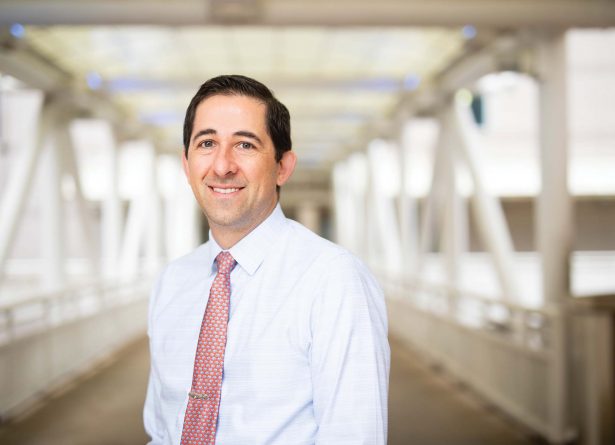
Benedetti, who came to Vanderbilt-Ingram in 2018 from Dana Farber/Boston Children’s Cancer and Blood Disorders Center, specializes in embryonal solid tumors of the kidney, adrenal gland and liver. The tumors include hepatoblastoma, neuroblastoma and nephroblastoma (Wilms tumor), the most common kidney cancer in children. They tend to occur in young children (normally birth to 5 years old).
Only about 15% of childhood cancers fall into Benedetti’s specialty, he said. Neuroblastomas make up about 8% of childhood cancer; kidney tumors make up about 6-7%, and liver tumors, like Jackson’s, make up about 1-2% of childhood cancers.
The reasons families choose Monroe Carell for cancer treatment, when it’s far from home, vary, but Benedetti said much of it boils down to expertise. There are often nuances within individual tumors, he said. Neuroblastomas, for example, are broken down into low risk, intermediate risk and high risk, and there are even different subgroups within high-risk neuroblastoma that may warrant different treatments.
“In pediatric oncology, if you’re a center that treats 200-300 new cancer patients a year — that’s a large-volume center — you’ll see the breadth of types of childhood cancer each year, even within these subgroups,” Benedetti said. “If you’re treated at a center that sees 50-100 new patients a year, the oncology team may see that breadth, but over a much longer span of time. The increased volume leads to physician comfort and familiarity managing the nuances, something that can certainly be comforting to families — to know their child’s oncologist and team have both understanding of the data and personal experience to know how to navigate their child’s illness.”
Benedetti said there are seven pediatric oncologists among the nearly 20 pediatric subspecialists who are board-certified in hematology/oncology within his practice at Monroe Carell. The others focus entirely on stem cell transplant and on nonmalignant hematology.
“When you look at solid tumor oncology, there are two of us who see nearly all of the cases, so it really does allow individual physicians to gain a lot of expertise. That is harder to do at smaller centers where having such a narrow focus isn’t a practical practice model.”
And it’s not just the oncologist with expertise, Benedetti said. It’s the entire multidisciplinary team. “That’s really important in solid tumors where we need the involvement of surgeons, interventional radiologists, radiation oncologists, among others,” he said.
Benedetti said for patients with hepatoblastoma, Monroe Carell’s expertise in liver transplantation is crucial. If a total hepatectomy (removal of the entire liver) is required to remove the tumor, liver transplant is necessary, and Vanderbilt’s pediatric liver transplant program has been ranked among the nation’s best.
Vanderbilt’s strong clinical research efforts are also key in treating patients with neuroblastoma, a rare cancer that develops in nerve tissue like the adrenal gland. Monroe Carell is participating in a phase 3 study of a radiopharmaceutical called iodine-131 MIBG — a very specific radioactive form of iodine attached to a molecule that gets infused (via an IV infusion), so that the radioactive element gets taken up directly by the cancer cells to deliver targeted radiation from within the cancer cells.
It’s been shown to be effective as a palliative treatment in relapsed and refractory neuroblastoma and is only offered at about 20 centers around the country. The clinical trial, through the Children’s Oncology Group, is offering and studying the treatment as part of the upfront therapy for children who are newly diagnosed with high-risk neuroblastoma and has brought in patients from around the country.
Full Confidence
J.D. Anderson’s long cancer journey took him from his home in Arapahoe, Nebraska, to Lincoln,
Nebraska, Chicago, Houston, and finally to Vanderbilt-Ingram Cancer Center.
When he had a colonoscopy in July 2012 at a small hospital in Arapahoe, the physician told him he had the largest tumor he had ever seen. After being diagnosed with colon cancer and seeing physicians in Lincoln and Chicago, he was referred to George Chang, MD, a surgeon at MD Anderson in Houston.
“We went there to see Dr. Chang, and he lined me up with Dr. (Cathy) Eng. Thank God he did. I had no idea she was the best in her field too. I was like, ‘Wow, the best surgeon and the best oncologist.’ I had them both.”
After chemotherapy and radiation, Anderson had surgery in 2013 to remove his tumor. But testing revealed the cancer had spread to his lymph nodes. He had stage 4 colon cancer.
When Eng left MD Anderson for Vanderbilt in 2019, Anderson followed.
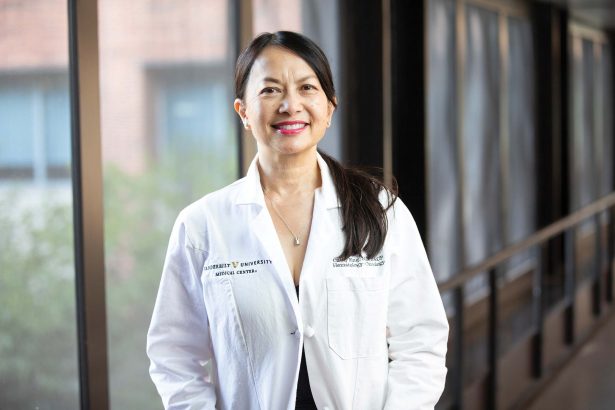
“Basically, after the surgery was over, it was just finding a way I could maintain life. Dr. Eng has done it for 11 years. I have a lot of confidence in her. When we found out she was leaving Houston, we were definitely following her.”
Cathy Eng, MD, FACP is the David H. Johnson Professor of Surgical and Medical Oncology, professor of Medicine and co-leader of the Gastrointestinal Cancer Research Program at Vanderbilt-Ingram.
Anderson sees Eng quarterly, and last April he learned the “cancer was coming back strong,” he said.
At an appointment with Eng, he learned he had a spot on his brain and some in his back. There’s cancer in a gland under his tongue and in his neck. “That’s the problem with me. It moves around,” he said.
Eng suggested a clinical trial for Anderson last December, but he was eliminated after it was determined one of his growths was too large for the trial. Under Eng’s direction he has recently begun another trial at Rutgers. He’s hoping for good results. Eng referred him there temporarily so he could be started on the clinical trial while pending clinical trial activation at Vanderbilt-Ingram.
“I love Vanderbilt-Ingram. I haven’t had to wait nearly as long to get things done, and I just feel a lot of confidence in what Dr. Eng has had me do,” Anderson said. “I went basically six years on chemo pills and maintained the cancer. It wasn’t until last April that we had to change things,” he said.
Anderson said he was impressed on his last visit when Eng recalled his entire 11-year history. “She had some students with her who were going to be future oncologists, and right off the cuff she told them my full history. I was like, ‘Wow, she remembered it all.’ That was so impressive.”
Eng said patients come from afar to Vanderbilt-Ingram because of the highly trained physicians who are recognized leaders in their field and for clinical trials they can’t find elsewhere.
“Many of us conduct clinical trial research. Often, we have written the trial personally, or we have served on an advisory board for an interesting promising agent and have been involved in early development of a national or international clinical trial,” she said.
One new therapy is on the horizon for patients with metastatic colorectal cancer who have run out of treatment options.
Results from an international clinical trial, published June 15 in The Lancet, show that the selective targeted therapy, fruquintinib, resulted in a statistically significant improvement in overall survival and progression-free survival. Patients who received fruquintinib had a median survival rate of 7.4 months compared to 4.8 months for patients who received placebo plus best supportive care and progression-free survival of 3.7 months versus 1.8 months. Participants who received fruquintinib had a 34% reduction in death compared to the placebo group. At six months, 24% of patients on fruquintinib were progression free versus 1% on placebo.
The FRESCO-2 clinical trial for fruquintinib was conducted at 124 sites across 14 countries. The study recruited patients with metastatic colorectal cancer who had not responded to other treatments and who had received a median of four prior lines of therapy.
Eng led the international trial as co-principal investigator. She is also the lead senior author of the study published in The Lancet.
Eng said if a newly diagnosed patient can only visit one site (if they live in a smaller community or don’t have the means to obtain multiple opinions), she recommends choosing a center with recognized leaders in the field of cancer.
Eng said her role as co-chair of the National Cancer Institute (NCI) Gastrointestinal Cancer Steering Committee allows her to be aware of upcoming clinical trials that are being discussed and supported by the NCI.
“This allows me the opportunity to stay on top of my game,” she said. She also gives multiple lectures and attends meetings internationally to stay on top of cancer literature and of potential research initiatives.
“The wonderful thing about academics, and this is why I chose academics, is that you can become so specialized. I fully respect our community colleagues, but they are not normally allowed the opportunity to focus on one or two cancers. I have chosen academic medicine because I have this opportunity to be solely focused on lower GI malignancies, and it allows me to become a better expert in my field.”
Eng said she has had patients from across the country including California, Florida and New York, and internationally from Canada, Mexico, Latin America and even Asia. Anderson is one of about 30 patients who followed Eng from MD Anderson to Vanderbilt.
Eng said Vanderbilt-Ingram physicians partner with patients’ community physicians so they can receive some of their cancer care, like chemotherapy, at home. “It’s important that they maintain their connection and relationship with their treating physician. I try to preserve that whenever possible because of the capability of patients to take time away from work and financial constraints.”
She recently received an email from a patient from California she hadn’t seen in two years. “She was in a clinical trial with me and has metastatic disease. She’s been free of cancer for three years and wanted me to know she’s doing great. That’s part of the inspiration for what I do. I work extremely hard; we all do, and medicine is challenging nowadays, but to get that gratitude and maintain that relationship with a patient where you really feel like they’re a family member…that’s something very special and why I treasure academic medicine and my job.”
Surgical Innovations
Vanderbilt-Ingram’s surgeons are also a draw for patients seeking the best in cancer care. Kamran Idrees, MD, MSCI, MMHC, Ingram Associate Professor of Cancer Research, is a highly sought-after surgeon for pancreatic cancer, peritoneal cancer and melanoma.
He recently treated a pancreatic cancer patient using IntraOp Mobetron IORT with electrons — the first surgery performed in Tennessee with this new technology utilizing intraoperative radiotherapy in the operating room.
The patient had been told her tumor was inoperable because of its proximity to major blood vessels, including the aorta.
Vanderbilt, the only Center of Excellence for pancreatic cancer in Tennessee as designated by the National Pancreas Foundation, is also the only hospital in the state with this advanced surgical technology. Idrees specializes in treating complex cancers of the pancreas, liver and bile ducts that may involve major blood vessels and adjacent organs. His patients include people with pancreatic and other abdominal cancers who have been told their tumors are inoperable.
“We are encouraged by the results of treating localized pancreatic cancer with electrons during surgery,” said Idrees, chief of the Division of Surgical Oncology and Endocrine Surgery. “We serve our patients by implementing the latest innovations at Vanderbilt to improve outcomes.”
Pancreatic cancer remains one of the deadliest forms of cancer. The location of the pancreas with its proximity to major vessels, duodenum, stomach, small and large bowel, liver and kidneys makes precision critical.
“With the precision of intraoperative radiation therapy, we can target any remaining cancer cells on or near blood vessels to vital organs to preserve them. With this technology, we can precisely give radiation to the area of concern during surgery while avoiding radiation to other organs,” Idrees said.
Standards Set
Vanderbilt-Ingram is also one of the nation’s top cancer centers for stem cell transplants and cellular therapies. It performs one of the highest volumes of transplants in the nation and consistently has one of the nation’s best survival rates. When pioneering cellular therapies, such as CAR T-cell therapy, it patterned the treatment paradigm for the new immunotherapy similarly to its highly successful stem cell transplant program.
“A lot of the patients we transplant are not from Nashville, so being able to have a clinic dedicated to not only supporting them, but tracking their care, has been instrumental to improving their long-term survival,” said Adetola Kassim, MBBS, MS, professor of Medicine and clinical director of the Adult Stem Cell Transplant Program.
Vanderbilt-Ingram began offering CAR T-cell therapy in 2015 through a clinical trial. At that time, patients had to be hospitalized for two months and closely monitored for serious reactions. That clinical trial by Vanderbilt and other academic cancer centers nationwide led to the approval of the powerful new immunotherapy. Vanderbilt oncologists have continued to improve this therapy and make it less of a burden for patients. They have demonstrated that patients can safely and successfully be treated without hospitalization. The outpatient protocol they developed has gained national attention.
A Big, Small Place
Vandana Abramson, MD, the Donna S. Hall Professor of Breast Cancer and co-leader of the Breast Cancer Research program, said there are two big reasons patients travel great distances for breast cancer treatment at Vanderbilt-Ingram: It’s known for its multidisciplinary patient-centered care, and it’s a national leader in breast cancer research.
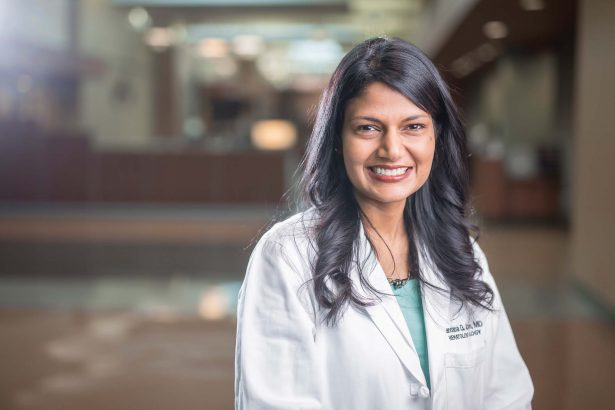
Vanderbilt-Ingram is home to two NCI-designated SPOREs (Specialized Programs of Research Excellence) — one in gastrointestinal cancer and the other in breast cancer — which have been funded since 2002 and 2003 respectively. There are only nine cancer centers in the United States with SPOREs for gastrointestinal cancers and only six for breast cancer.
“All of the breast cancer specialists, including medical oncologists, surgeons, radiation oncologists, plastic surgeons, radiologists, nurse practitioners and genetic counselors are in one space so that patients can see everyone and undergo testing and biopsies conveniently,” she said. “This approach also allows the team to communicate and collaborate effectively to make the best plan for the patients.”
Abramson said Vanderbilt-Ingram, the only National Comprehensive Cancer Network (NCCN)-designated cancer center for adult breast cancer in Tennessee, also has a dedicated breast cancer pharmacist, Keaton Gaffney, PharmD, who works closely with the team, and there’s an infusion center dedicated solely to breast cancer patients.
Vanderbilt-Ingram’s basic science and translational researchers have been leaders in breast cancer discoveries, and these discoveries have led to many clinical trials to discover better treatments for patients, she said. Many of the clinical trials are written by Vanderbilt investigators, and there are frequent collaborations with research networks throughout the country and with pharmaceutical companies to provide clinical trials that can offer patients innovative treatment options.
Clinicians who are treating patients with metastatic breast cancer must take all of a patient’s circumstances into consideration when devising a treatment plan, Abramson said. “Patients face challenges not only from the treatment, but they are considering what their future might look like, because at this point, we don’t have a cure for most patients with metastatic disease,” Abramson said. “We have to think about quality of life and how to make their goals achievable, how they can have meaningful time with their family, children and friends. And more than in any other setting, we want to think about how to balance the toxicity of treatment with their day-to-day life because they are going to need some sort of treatment for the rest of their lives.”
Abramson, who is on the NCCN committee that writes national breast cancer guidelines, recalls a patient with metastatic breast cancer who traveled monthly from Alaska for a clinical trial targeting a specific subtype of breast cancer. The clinical trial stemmed from research from the lab of Jennifer Pietenpol, PhD, and Brian Lehmann, PhD, which led to a national study evaluating blockade of the androgen receptor in breast cancer.
“What sets us apart is physicians who are at the forefront of research and clinical trials, but also clinical experts in their field,” Abramson said. “That combination, along with all the resources we have and our own laboratory research, makes us a draw for patients. We are a top center in terms of breast cancer research and treatment, yet we are small enough that patients can get on the phone with us and know our team well. Vanderbilt-Ingram is kind of like Nashville — a big, small place.”
